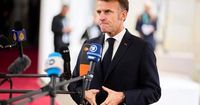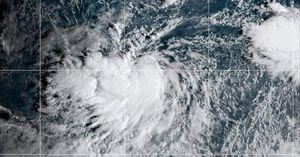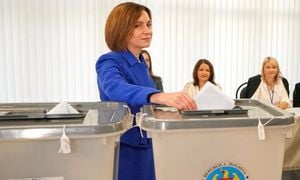French President Emmanuel Macron has signaled a significant shift in France’s nuclear and security posture, confirming that the country is preparing to update its nuclear doctrine amid mounting tensions in Europe. In a wide-ranging interview published on October 1, 2025, Macron emphasized France’s enduring nuclear capabilities and laid out a vision for deeper strategic collaboration with European partners—at a time when the continent faces escalating security threats from Russia.
"The French nuclear umbrella exists. I am currently working on updating our doctrine and would like to continue deepening our strategic dialogue with the Europeans who are willing to do so," Macron told the Frankfurter Allgemeine Zeitung (FAZ). He underscored that France’s nuclear commitment has carried a European dimension since 1962, referencing the legacy of French nuclear policy and its role in continental security. Macron also announced plans to deliver a major speech on France’s nuclear doctrine at the beginning of 2026, a move that is expected to clarify France’s stance and reassure allies.
This renewed focus on nuclear deterrence comes as Europe grapples with a spate of Russian provocations. In the same interview, Macron made headlines by declaring that France would not rule out downing a Russian fighter jet if it entered European airspace without authorization. When asked directly by FAZ whether he would support shooting down such an aircraft, Macron replied, "In accordance with the doctrine of strategic ambiguity, I can tell you that nothing is ruled out." This statement, delivered with characteristic French resolve, reflects a growing willingness to adopt a firmer stance against Russian incursions and signals a new phase in European defense policy.
The context for Macron’s remarks is a series of alarming incidents across Eastern Europe. Just last month, Romania’s defense ministry reported that a Russian drone had breached its airspace during an attack on Ukrainian infrastructure—an event that underscored the vulnerability of NATO’s eastern flank. Meanwhile, Poland, another NATO member, announced it had shot down Russian drones that violated its airspace as Moscow intensified its aerial barrage against Ukraine. These incidents have left European leaders jittery, with many calling for a more robust response to what they see as deliberate Russian provocations designed to test NATO’s resolve.
Macron, never one to shy away from bold language, warned last week that NATO’s response to further provocations from Moscow would have to "go up a notch." His comments suggest that France, long seen as a pillar of European defense, is prepared to take a leadership role in shaping the alliance’s response. The French president’s invocation of "strategic ambiguity"—a doctrine that keeps adversaries guessing about the precise circumstances under which force might be used—marks a departure from the more cautious rhetoric that has sometimes characterized European security debates.
But Macron’s security concerns are not limited to airspace violations. On the same day as his nuclear doctrine announcement, he revealed that France is investigating an EU-sanctioned, Russian-linked oil tanker named the Boracay, which is currently anchored off the French coast. The Boracay, a Benin-flagged vessel blacklisted by the European Union for its role in Russia’s so-called "shadow fleet"—a network of ships used to evade Western sanctions—is suspected of "serious offenses," according to Macron. The French president did not elaborate on the nature of these offenses, but the investigation has drawn attention to the increasingly complex web of economic and security challenges facing Europe.
Adding another layer of intrigue, the specialist website The Maritime Executive has reported that the Boracay may have been involved in mystery drone flights that disrupted air traffic in Denmark in September 2025. While details remain sparse, the suggestion that a Russian-linked vessel could be tied to aerial disruptions in Northern Europe has only heightened anxieties about the reach and sophistication of Moscow’s hybrid tactics.
France’s nuclear arsenal, one of only two in Europe, has long been a cornerstone of the country’s defense strategy. Since 1962, French leaders have maintained that their nuclear forces serve not only national interests but also contribute to the collective security of Europe. Macron’s decision to update the nuclear doctrine comes at a moment when the credibility of nuclear deterrence is being tested by new forms of warfare—drones, cyberattacks, and economic subterfuge—that fall outside the traditional boundaries of Cold War-era thinking.
European partners are watching closely. Some, particularly in Eastern Europe, have welcomed France’s more assertive posture, seeing it as a necessary counterweight to Russian aggression. Others, mindful of the risks of escalation, have urged caution and stressed the importance of maintaining open channels of communication with Moscow. Macron, for his part, appears determined to walk a careful line—projecting strength while leaving room for dialogue. "In any case, there has been a European dimension since 1962," he reminded FAZ, reinforcing the idea that France’s security is inextricably linked to that of its neighbors.
The upcoming speech on nuclear doctrine, slated for early 2026, is expected to address these complexities head-on. Observers anticipate that Macron will outline not just the technical parameters of France’s deterrent, but also the political and ethical considerations that come with wielding such power in an unpredictable world. The speech is likely to serve as both a reassurance to allies and a warning to adversaries that France is prepared to defend its interests—and those of Europe—by all means necessary.
Meanwhile, the investigation into the Boracay and the ongoing incidents along NATO’s eastern border have injected a sense of urgency into European security discussions. As the continent braces for what may be a protracted period of tension with Russia, the choices made by leaders like Macron will shape the future of transatlantic defense for years to come.
For now, one thing is clear: France is determined to play a central role in safeguarding Europe’s security, both through its nuclear umbrella and its willingness to confront new forms of aggression. As Macron prepares to unveil his vision for the next chapter of French nuclear doctrine, the eyes of Europe—and indeed the world—will be watching closely.




